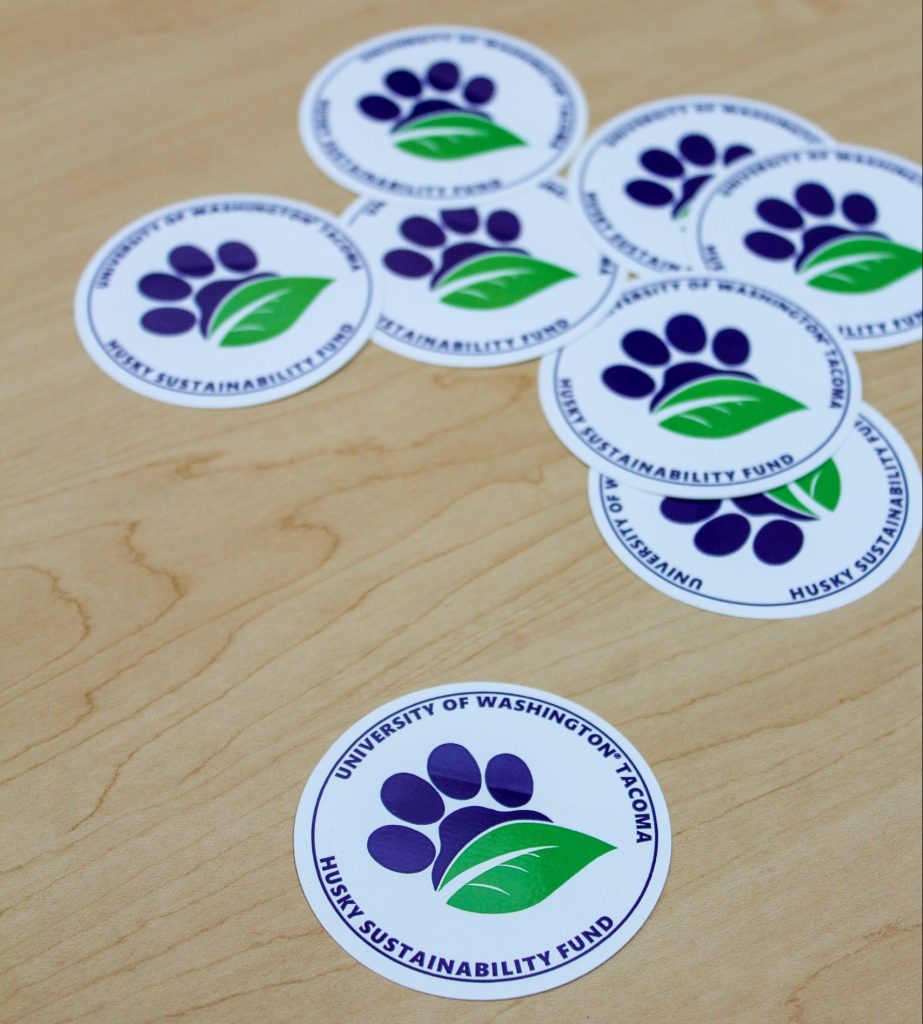The Husky Sustainability Fund now accepting applications
The Husky Sustainability Fund provides grants for student-led projects that seek to improve the student experience at UWT.

A new UWT program, the Husky Sustainability Fund, is supporting student-led projects that focus on campus sustainability. The Husky Sustainability Fund provides an opportunity for UWT students to grow positively, while also serving students’ various needs and creating a way for them to be seen and heard in the process. All UWT students are eligible to apply.
“We all are living in a world, and within institutions, that are just kind of unsustainable. We do the best we can, but the Husky Sustainability Fund looks at ways we can support students in addressing some of those challenges. We explore ways that we can make small changes, or ways we can make huge policy changes in what the university is providing to students. We want projects to be student-led and student-focused,” said Genevieve Conley, Student Sustainability Coordinator for the Center for Student Involvement.
The Husky Sustainability Fund encourages students to create and pursue projects focused on subjects they are passionate about. Projects can be in line with the applicant’s field of study but do not have to be. The goal of the program is to create an avenue for student voices and experiences to be heard, while making UWT a more sustainable place overall.
The Husky Sustainability Fund awards grants for student projects that aim to improve social, economic, or environmental sustainability at UWT. Though the program takes a holistic view to sustainability, Conley explains there is often a misunderstanding of what the term means for the program.
“Sustainability as a term is so broad and used so often to mean so many things. A lot of times when we think of sustainability, we think of things like recycling, which is valuable but it’s not the only thing,” Conley said, “There are so many different options. I don’t want students to think we’re only focusing on recycling or planting trees, which are great projects by the way.”
Conley says social sustainability projects could be anything that focuses on social issues such as community creation and growth, accessing information, social movements, human rights, getting people out to vote or issues with safety on campus.

In autumn of 2022, as a social sustainability project, the Husky Sustainability Fund, in partnership with the Student Activities Board, brought Tacoma Poet Laureate and UWT Alumni Ty Nguyen to campus to perform spoken word about sustaining and retaining culture in America. This event intentionally encouraged a safe space for cultures to be acknowledged and celebrated through storytelling and community building. In addition to Ty Nguyen’s performance, ten UWT student poets shared their own work to an audience of approximately 50 student attendees. Conely explains this as a wonderful example of social sustainability.
Economic sustainability projects could be focused on parking access, transportation, housing access or addressing food insecurity. Conley explains economic sustainability projects should approach how UWT can spend money in a more efficient and effective way.
Environmental sustainability projects could be focused on urban gardening, waste reduction, improving energy efficiency, creating more green spaces on campus, bringing solar power to UWT, or encouraging students to get outdoors.
“There are so many opportunities for environmental sustainability because anything that hits the ground goes to the sound,” Conley said, “It can also be something like how do we create green spaces on campus? How do we create spaces where people want to be outside?”
Conley says projects that bring more green spaces to the UWT campus would help to elevate people’s moods, offer a place for meditation, and encourage gathering and community building.
The Husky Sustainability Fund has two application types, mini grants and large grants. Mini grants are awarded on a rolling basis and can be dispersed within the same quarter as the application is submitted, though students have the choice to schedule the funding further out if desired. Mini grants are awarded for projects that fit into one or more of the sustainability categories and are requesting $1000 or less.
Large grants are for projects that request $1000 or more. Large grants have a more involved application process and are typically funded after the application quarter. Projects requesting a large grant must also fit into one or more of the sustainability categories.
Applications can be submitted for both grant types until March 6. Conley invites students to meet with her and her team to work together throughout the application process.
“It is intimidating when we say apply for funding,” Conley said, “You’re not on your own filling out the application. We will help you through the entire process.”
In addition to filling out the application, students are encouraged to contact Conley and her team, talk through their ideas, connect with campus and community partners and receive guidance on navigating the application process.
The Husky Sustainability Fund also has a “submit an idea” option, for students who may have an idea but are unavailable to pursue the project. This allows students to have their voices heard and ideas shared, without being obligated to take on any project or responsibility. This enables students who may have a theme in mind, but no project idea, to work with the Husky Sustainability Fund team to bring their theme to life.
The Husky Sustainability Fund is funded through student services and activities fees included in UWT tuition. Grants are awarded on an annual basis by the Services and Activities Fee Committee (SASC).To learn more or apply for a grant, visit the Husky Sustainability Fund website at: https://www.tacoma.uw.edu/involvement/hsf



